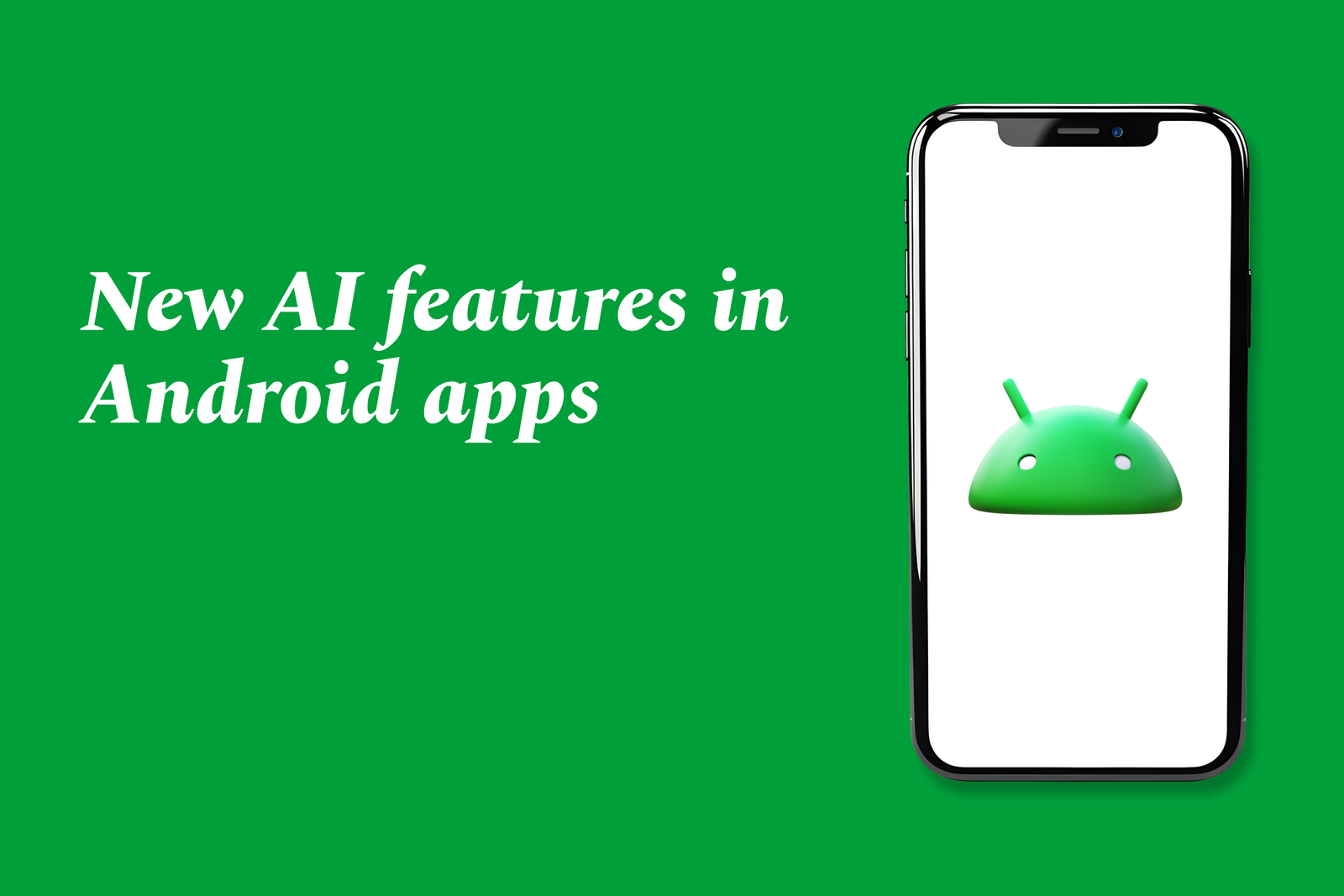New AI Features in Android Apps
New AI features in Android apps, powered by Gemini APIs and tools like Magic Editor and Duet AI, enable enhanced creativity, automation, and personalized experiences. These innovations streamline tasks and enrich user interaction across diverse devices and app categories.
New AI features in Android apps
1 ) Integration of Gemini APIs for AI Powered Android Apps
Developers can now build advanced AI experiences in Android apps using the new Gemini APIs.
These tools enable app creators to integrate powerful generative AI capabilities directly, enhancing functionality and user interaction.
2 ) AI Tools for Everyday Tasks
Android apps are being enhanced with AI features that simplify daily activities.
Examples include assistance with event decoration ideas or recipe adjustments, making the user experience more intuitive and helpful.
3 ) Magic Editor and Gen AI Wallpapers
New creative AI tools such as Magic Editor transform photos from ordinary to extraordinary with effortless editing.
Gen AI Wallpapers allow users to generate imaginative, personalized wallpapers using AI, adding a personalized touch to devices.
4 ) Duet AI Automation
Duet AI enables automation within Android apps by interpreting natural language keywords.
This feature helps automate tasks seamlessly, improving productivity and efficiency in app usage.
5 ) Comprehensive Developer Resources
Google provides extensive training courses, tutorials, and tools for developers to create AI powered apps effectively.
Resources include Kotlin for Android, Compose for teams, and monetization strategies with Google Play.
6 ) Across Device AI Experiences
AI driven apps are designed to provide consistent, seamless experiences across multiple devices including phones, tablets, Wear OS watches, Android Auto, Android TV, and ChromeOS.
This ensures users enjoy AI enhancements regardless of the device they use.
7 ) Category Specific AI Development Guidance
Google offers structured guidance for building apps tailored to specific categories such as games, camera & media, social & messaging, and health & fitness.
This prescriptive support helps developers leverage AI appropriately for their app’s use case.
Summary:
Android apps are leveraging new AI features powered by Gemini APIs and other Google AI tools to revolutionize user interaction. From creative tools like Magic Editor and personalized wallpapers to automation with Duet AI, the platform is significantly enhancing app capabilities. Developers are supported with robust resources and device integration guidance to build innovative AI experiences that span diverse Android devices and app categories.
https://justacademy.in/news-detail/google-i/o-2025-highlights:-flutter-takes-the-lead
https://justacademy.in/news-detail/flutter-+-gemini-ai-integration-tutorial
https://justacademy.in/news-detail/future-of-flutter-careers-post-2025
https://justacademy.in/news-detail/android-15-beta-released:-key-features-to-know
https://justacademy.in/news-detail/performance-testing-in-flutter-4.0
Related Posts
In 2025, top Angular libraries offer modern, feature-rich components and tools for building dynamic web apps. From powerful data grids to low-code platforms like UI Bakery, these libraries enhance development speed, UI design, and scalability, making them essential for Angular developers.
Migrating from AngularJS to Angular 17 involves gradually upgrading your app by running both frameworks together using tools like ngUpgrade, rewriting components in TypeScript, and adopting Angular’s modern architecture to enhance performance, maintainability, and long-term support.
Angular state management tools help organize and handle app data efficiently, improving scalability and maintainability. Popular options include NgRx for robust, RxJS-based patterns, and newer Signal Store solutions that offer simpler, reactive approaches integrated tightly with Angular’s latest features.
RxJS in Angular empowers developers to manage asynchronous data streams with powerful operators like `forkJoin`, `combineLatest`, and `zip`. Mastering these key operators in 2025 is essential for building efficient, reactive applications that handle complex event sequences seamlessly.
Angular performance optimization in 2025 focuses on improving app speed and responsiveness by using techniques like OnPush change detection, lazy loading, efficient data caching, and AOT compilation. These practices reduce load times, enhance user experience, and ensure scalable, fast Angular applications.
In 2025, Angular remains preferred for large-scale, enterprise apps with its robust, all-in-one framework, while Vue attracts developers seeking simplicity and fast development for smaller projects. Both frameworks excel, with choice driven by project needs and team expertise.
Angular Signals are a new reactive primitive in Angular 16 that enable fine-grained, efficient change detection by automatically tracking dependencies and updating only affected parts of the UI. They simplify state management and boost app performance, revolutionizing Angular's reactivity model.
Angular interview questions to prepare in 2025 focus on core concepts like components, directives, data binding, routing, and dependency injection, along with TypeScript mastery and latest Angular features to ensure strong practical knowledge for building scalable, efficient web applications.
AngularJS reached its official end of support in January 2022, meaning no further updates or security patches. To ensure app security and performance, developers should consider migrating to modern Angular versions or seek third-party long-term support options if immediate migration isn’t possible.
The Angular Roadmap 2025 highlights upcoming features focused on improving developer experience and performance, including zoneless Angular, Signals integration, enhanced Forms, async data handling, improved HMR, and expanded Angular Material/CDK enhancements, driving modern, efficient web app development.










